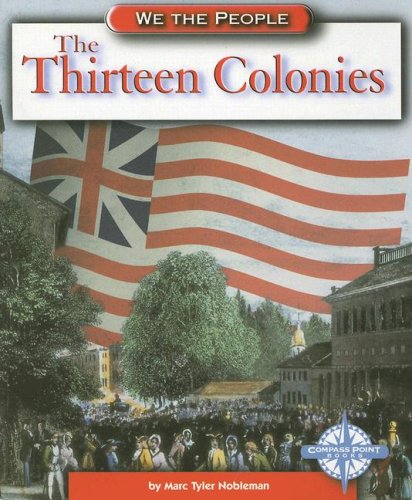-
The Thirteen Colonies
Louis B. Wright
eBookIf the origin of the colonial period was accidental, the ending was not. The representatives of the thirteen colonies who approved the Declaration of Independence in 1776 charted a collision course, aware of the obstacles in their path and the risks they were taking.The events that led to their decision took place over a period of nearly 300 years. Looking back, the wonder is that it culminated so quickly. For a century after its discovery, the New World was little more than a lode to be mined by adventurers seeking profits. It wasn't until the end of the sixteenth century that serious efforts were made to establish permanent colonies. Even then, the perils of the journey and threats of starvation inhibited settlement.But settlers gradually came, spurred, in part, by the fear of religious persecution, but above all, drawn by the hope of owning land. They were a mixed lot: English Separatists from Leiden, French Huguenots, Dutch burghers, Mennonite peasants from the Rhine Valley, and a few gentleman Anglicans. But they shared a quality of toughness.Here is their story from award-winning historian Louis B. Wright.
-
The Thirteen Colonies
Marc Tyler Nobleman
Library Binding (Compass Point Books, Jan. 1, 2002)Introduces the European immigrants who came to North America as explorers and settlers, their interactions with native people, and the wars that ultimately led to their independence. X
X
-
The Thirteen Colonies
Louis B. Wright
Paperback (New Word City, Sept. 6, 2018)If the origin of the colonial period was accidental, the ending was not. The representatives of the thirteen colonies who approved the Declaration of Independence in 1776 charted a collision course, aware of the obstacles in their path and the risks they were taking. The events that led to their decision took place over a period of nearly 300 years. Looking back, the wonder is that it culminated so quickly. For a century after its discovery, the New World was little more than a lode to be mined by adventurers seeking profits. It wasn't until the end of the sixteenth century that serious efforts were made to establish permanent colonies. Even then, the perils of the journey and threats of starvation inhibited settlement. But settlers gradually came, spurred, in part, by the fear of religious persecution, but above all, drawn by the hope of owning land. They were a mixed lot: English Separatists from Leiden, French Huguenots, Dutch burghers, Mennonite peasants from the Rhine Valley, and a few gentleman Anglicans. But they shared a quality of toughness. Here is their story from award-winning historian Louis B. Wright.
-
The Thirteen Colonies - New Jersey
Thomas Streissguth
Hardcover (Lucent Books, Dec. 14, 2001)Overshadowed by its neighbors in Pennsylvania and New York, colonial New Jersey became a bloody meeting ground of the British and Continental armies during the American Revolution. This volume untangles the busy settlement and complex history of New Jersey, the melting pot of colonial America. U
U
-
The Thirteen Colonies
Dennis B. Fradin
Library Binding (Childrens Pr, Jan. 1, 1989)Discusses events that led to the founding of the Thirteen Colonies P
P
-
The New Jersey Colony
Kevin Cunningham
Library Binding (Childrens Pr, Sept. 1, 2011)A history of the large mid-Atlantic colony and its role in the American Revolution. S
S
-
The New Jersey Colony
Kevin Cunningham
Paperback (Scholastic, Sept. 1, 2011)A history of the large mid-Atlantic colony and its role in the American Revolution. S
S
-
The Thirteen Colonies
Marc Tyler Nobleman
Paperback (Compass Point Books, Jan. 1, 2002)Introduces the European immigrants who came to North America as explorers and settlers, their interactions with native people, and the wars that ultimately led to their independence. X
X
-
The Thirteen Colonies
Louis B. Wright
Paperback (CreateSpace Independent Publishing Platform, Jan. 11, 2017)If the origin of the colonial period was accidental, the ending was not. The representatives of the thirteen colonies who approved the Declaration of Independence in 1776 charted a collision course, aware of the obstacles in their path and the risks they were taking. The events that led to their decision took place over a period of nearly 300 years. Looking back, the wonder is that it culminated so quickly. For a century after its discovery, the New World was little more than a lode to be mined by adventurers seeking profits. It wasn’t until the end of the sixteenth century that serious efforts were made to establish permanent colonies. Even then, the perils of the journey and threats of starvation inhibited settlement. But settlers gradually came, spurred, in part, by the fear of religious persecution, but above all, drawn by the hope of owning land. They were a mixed lot: English Separatists from Leiden, French Huguenots, Dutch burghers, Mennonite peasants from the Rhine Valley, and a few gentleman Anglicans. But they shared a quality of toughness. Here is their story from award-winning historian Louis B. Wright.
-
The Thirteen Colonies
Brendan January
Paperback (Childrens Pr, March 1, 2001)Examines the creation of the original thirteen colonies in the United States, from the failed colony of Roanoke in 1587 to the formation of the Georgia colony in 1733. U
U
-
The Thirteen Colonies
Brendan January
Library Binding (Childrens Pr, Sept. 1, 2000)Examines the creation of the original thirteen colonies in the United States, from the failed colony of Roanoke in 1587 to the formation of the Georgia colony in 1733. W
W
-
The Thirteen Colonies
Gail Sakurai
Paperback (Childrens Pr, Sept. 1, 2000)Describes the history of the thirteen original English colonies in America, including their early exploration, settlement, and regional differences. U
U